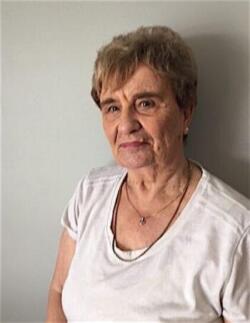1959 Hidden truth and diversion
Like Every Form of Love: A Memoir of Friendship and True Crime
by Padma Viswanathan
Toronto: Penguin Random House Canada, 2023
$35 / 9781039006201
Reviewed by Valerie Green
*
 This book is described as A Memoir of Friendship and True Crime. It is also two separate stories within a story while describing many different forms of love.
This book is described as A Memoir of Friendship and True Crime. It is also two separate stories within a story while describing many different forms of love.
Padma Viswanathan’s is indeed her own memoir of how she first met Phillip, a warm-hearted, gay man while staying on a houseboat at Genoa Bay on Vancouver Island. They struck up an unlikely relationship which was destined to last for decades.
The author is intrigued by Phillip once he tells her the story of his life from childhood, and it is this that keeps them connected through the years. The more she gets to know about this man, the more she feels convinced his story and that of his stepmother, Del, should be written.
Phillip was the son of an abusive father, Harvey, a miner, and a farmer who held communistic views. Once Phillip’s mother left the family, Harvey had advertised for a housekeeper-with-benefits, and the intriguing and very colourful Del applies for the job.
Del’s life story is even more fascinating. A few of her daring escapades in the past included being a convicted bank robber, violating her parole and becoming a suspect in her ex-husband’s murder! In addition, Del had stories to tell about the time she “hung out” with Fidel Castro and Che Guevara in Mexico City before the Cuban Revolution. But during her time with Harvey and Phillip, she was the only person to ever show him love. By the time Philip met the author, he had lost touch with Del but had never forgotten her.

These two stories within the memoir are, in my opinion, the more important and richer tales that could well have filled two separate books. As Viswanathan digs deeper into Phillip’s past, she unravels a plethora of hidden truths that will indeed hold the reader’s attention. Unfortunately, her constant diversion into quotes from other writers about how they would think or deal with a particular situation, take away the pace of her own story. As a reader, I found myself asking: Why do we need to know that? Why are we taking all these many detours? Was the author in fact telling her readers the story of Hans Christian Anderson’s Snow Queen and, if so, why compare her tale with another? To me, this constantly sidetracked from the main theme of her own book. By the time the end of the book is reached, it is hard to decide what the story is about.
This criticism is by no means an unsympathetic reflection on the author’s ability to tell an excellent story with rich prose which is indeed poignant and exhilarating in many parts. But, as she delves deeper, I found the detailed descriptions of Phillip’s life as a lost soul using many partners to make himself feel better, somewhat distasteful. Others may see it differently.
On page 268, the author writes: “On returning from Cuba (where she had been doing more research for her book), I finished a draft of this book. It failed, as I said. I couldn’t put the pieces together, couldn’t find the shape.” Her husband, Geoff, had asked her: “Why don’t you write it as a novel? That’s something you know how to do.” I agree with him. As mentioned, these stories of Philip and Del could have stood alone as two separate novels.
But she author goes on to say: “Reader, I tried. That failed, too. I couldn’t get inside either Del’s or Harvey’s head to invent actions or motivations. Phillip’s, yes, because we loved each other, and he’d given me permission, and I believed he had really bared himself to me.”
*

Valerie Green was born and educated in England where she studied journalism and law. Her passion was always writing from the moment she first held a pen in her hand. After working at the world-famous Foyles Books on Charing Cross Road, London, followed by a brief stint with M15 and legal firms, she moved to Canada in 1968 where she married and raised a family, while embarking on a long career as a freelance writer, columnist, and author of over twenty non-fiction historical and true-crime books. Hancock House recently released the first three books—Providence, Destiny, and Legacy—of Valerie’s four-book historical fiction series The McBride Chronicles, a historical family saga that brings early BC history alive. Now semi-retired (although writers never really retire!) she enjoys taking short road trips around BC with her husband, watching their two beloved grandsons grow up and, of course, writing. [Editor’s note: Valerie Green has recently reviewed books by Carolyn Redl, Jennifer Manuel, Beka Shane Denter, S. Lesley Buxton and Sue Harper, Jennilee Austria-Bonifacio, John D’Eathe for BCR.]
*
The British Columbia Review
Interim Editors, 2023-24: Trevor Marc Hughes (non-fiction), Brett Josef Grubisic (fiction)
Publisher: Richard Mackie
Formerly The Ormsby Review, The British Columbia Review is an on-line book review and journal service for BC writers and readers. The Advisory Board now consists of Jean Barman, Wade Davis, Robin Fisher, Barry Gough, Hugh Johnston, Kathy Mezei, Patricia Roy, Maria Tippett, and Graeme Wynn. Provincial Government Patron (since September 2018): Creative BC. Honorary Patron: Yosef Wosk. Scholarly Patron: SFU Graduate Liberal Studies. The British Columbia Review was founded in 2016 by Richard Mackie and Alan Twigg.
“Only connect.” – E.M. Forster
11 comments on “1959 Hidden truth and diversion”